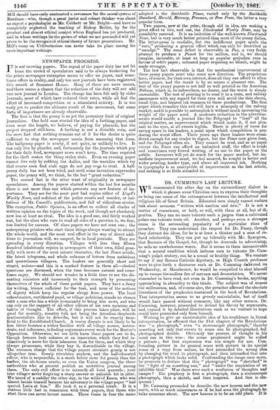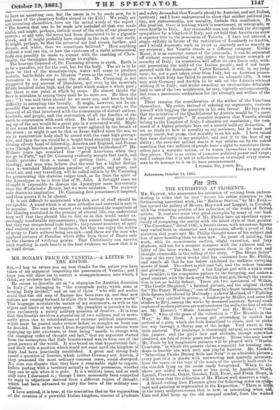DR. CUMMING'S LAST LECTURE.
WE commented the other day on. the extraordinary dialect in which it pleases some Christian men to express their thoughts as being one cause of the estrangement between the intellectual and religious life of Great Britain. Educated. men simply cannot endure talk about sermons " written with unction and dew." It is not a matter of conscience, or faith, or will, with them at all, but of di- gestion. They can no more tolerate such a jargon than a cultivated palate can tolerate train oil. Another, and perhaps even a stronger cause is the astounding popularity of a particular class of preacher. They can understand the respect for Dr. Pusey, though, they distrust his ideas, for he is at least a thinker and a man of re- fined scholarship. They can put up tolerably with Mr. Spurgeon. that Barnum of the Gospel, for, though he descends to advertising, he sells no unwholesome wares. But it seems to them inconceivable that a mental condition which induces men to tolerate Dr. Cum- ming's pulpit oratory, can be a sound or healthy thing. We venture to say if any Roman Catholic dignitary, or High Church professor were to give forth a discourse such as Dr. Cumming delivered on. Wednesday, at Manchester, he would be compelled to shut himself up to escape the endless fire of sarcasm and denunciation. We never remember to have read, not even. in Dr. Cumming's books, anything approaching in absurdity to this tirade. The subject was of course the millennium, and, of course also, the preacher affirmed the absolute literalness of the prophecies contained in the book of Revelations. That interpretation seems to us grossly materialistic, but of itself would have passed without comment, like any other sermon. Dr. Cumming, however, proceeded to defend his theory by arguments, and expand it by detailed illustrations such as we venture to hope could. have proceeded only from himself. Wishing to give an unmistakable idea of his confidence in literal interpretation, he affirmed that the 21st chapter of the Revelations was "a photograph," even "a stereoscopic photograph," thereby asserting not only that events to come can be photographed, but photographed double. Obviously the process of thought in his mind ran in this wise : the scene prophesied might be called a picture ; but that expression was too simple for use. Con- founding picture in its general sense with picture in its special sense of a copy from nature, lie first intensified the wrong idea by changing the word to photograph, and then intensified that into a photograph which looks solid. Confounding the image once more, he proceeds to declare that this " photograph" was °sketched" in the " fight of an unseating sun," and " under the inspiration of an infallible God." Was there ever such a confusion of thoughts and images ? The prophecy is first a photograph, then a stereoscopic photograph,. then a sketch, and then inspired. And this is elo- quence !
Dr. Cumming proceeded to describe the new heaven and the new earth, with as much minuteness as if he had seen the photograph he talks nonsense about. "The new heaven is to be an odd place. It is
to have an insetting sun, but the moon is to be made new, for it and some of the planetary bodies sinned in the Fall ! We really are not inventing absurdities, here are hid n words of the report : "The heaven that was to be made new included all that was made sinful, and might, perhaps, include some of the orbs.of our planetary system ; at any rate, the moon had been discovered to be a gigantic wreck, and it might probably have shared in the ruin of our earth. It might, perhaps, be that the primeval sin had struck further, and deeper, and wider, than we sometimes believed." How anything. without a soul can sin, or how the existence of a sinful astronomical body can possibly be made to consist with the teaching of Chris- tianity, the theologian does not deign to explain.
The heavens disposed of, Dr. Cumming returns to earth. Earth is to be a paradise, not for the soul, but for the body. The air is to be fresh as that of the mountain-tops, water will cease to produce malaria, battle-fields are to blossom "even as the rose," a physical Jerusalem is to descend upon the world. Dr. Cumming is not staggered by any amount of literalness, not even by the mountain fifteen hundred miles high, and the pearl which makes a whole gate ; but there is one point at which he stops. He almost thinks the Seer is mistaken in saying there shall be no more sea. He likes the sea : "It was said there should be no more sea, and here he had a difficulty in accepting this literally. It might, however, not be im- possible that no more sea meant the same as no more night, or the removal of all that interfered with the communion of distant nations, kindreds, and people, and the restoration. of all the families of the earth to communion with each other. He had a feeling that a dry- ing up of the sea would be a great gap in a renovated world. Might it not mean that the sea would be no more agitated by the breath of the storm ; or might it not be that as Jesus walked upon the sea, so we in resurrection body shall be armed with the same high preroga- tive, and then the sea would be a bright band clasping together in a shining silvery bond of fellowship, America and England, and France even (though hopeless at present), in one joyous brotherhood ?" Mr. Holmes years ago remarked that " good Americans when they die ggoo to Paris," and Dr. Cumming evidently accepts that truth, and kindly provides them a means of getting there. And this is theology, and men who believe that the soul has a higher destiny than a wretched Mahomedan paradise of pearls, and gems, and sweet air, and easy travelling, will be called infidels by Dr. Cumming for pronouncing this doctrine vulgar trash, as far from the spirit of the Apocalypse as he is from that of St. John. A. fortnight since we thought it impossible to discuss the Apocalypse more Irreverently than the Westminster Review, but we were mistaken. The reviewer only denies its inspiration. Dr. Cumming first pronounces it inspired, and then proves it to be absurd.
It is not difficult to understand why this sort of stuff should be ace eptable. A creed which is at once orthodox and material is sure to be popular. The men who cannot even understand the magnitude of the blessing contained in the promise of eternal life, can understand very well that they should like to live on in this world under ex- ceedingly comfortable circumstances; they cannot imagine holiness, but they can comprehend rude health; they cannot conceive of spiri-
tual content as a source of happiness, but they can enjoy the notion of going to Paris without being sea-sick—and these are the men who applaud pictures of Paradise which differ from those of Dante only in the absence of vivifying genius. That Christianity can survive such teaching in such hearts is the best evidence we know that it is in itself divine.































 Previous page
Previous page